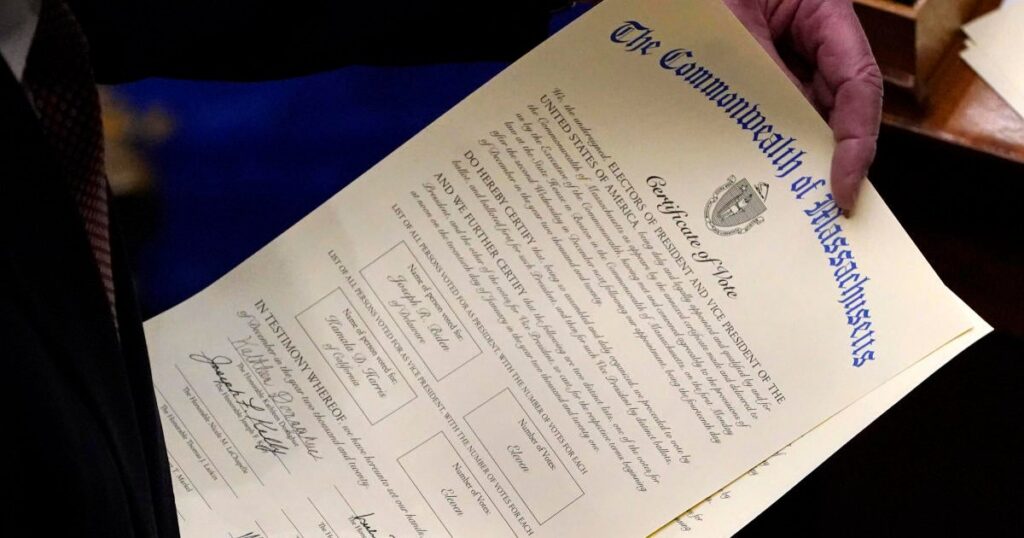At state capitols across the U.S. Tuesday, the presidential electors will be gathering to cast their electoral votes, formalizing President-elect Donald Trump’s victory over Vice President Kamala Harris in the 2024 election.
It’s largely a ceremonial vote, the next step after the presidential election. When Americans cast their ballots on Election Day, they’re technically voting for a slate electors committed to supporting their choice for president and vice president.
How does the Electoral College work?
The rules governing the Electoral College are outlined by the 12th Amendment.
Presidential electors, according to the amendment, “shall name in their ballots the person voted for as President, and in distinct ballots the person voted for as Vice-President, and they shall make distinct lists of all persons voted for as President, and of all persons voted for as Vice-President, and of the number of votes for each, which lists they shall sign and certify.”
The political parties choose the slate of electors ahead of the general election.
After Election Day, all the votes are counted and then certified by each state. According to the 2022 Electoral Count Reform Act, the deadline to certify the results is set at six days before the electors are scheduled to meet, traditionally on the first Tuesday after the second Wednesday in December.
The Electoral Count Reform Act of 2022 also requires that each state determine a state official — the governor unless specified otherwise — to be responsible for submitting the “certificate of ascertainment” that identifies the state’s electors and includes a security feature.
What were the 2024 Electoral College results?
Trump won 312 Electoral College votes to Harris’ 226. See state-by-state results here and below.
Nationally, Trump also won the popular vote, winning 77.2 million votes to Harris’ 75 million.
How many electoral votes does each state have?
The Electoral College consists of 538 electors, and a majority of 270 is needed to become president.
Each state’s electoral votes are equal to the number of representatives they have in the House, plus two senators.

While the number of Electoral College votes has remained at 538 since 1964, the number of votes per state changes to match congressional apportionment after the decennial census. Between the 2020 election and the 2024 election, Texas gained two Electoral College votes, while five other states — Colorado, Florida, Montana, North Carolina and Oregon — gained one electoral vote each. Six states lost an electoral vote: California, Illinois, Ohio, Michigan, New York, Pennsylvania and West Virginia.
The map below shows the changes by state between the 2020 election and the 2024 election.

Does each elector have to vote with the state election results?
Forty-eight states and Washington, D.C., are winner-take-all, so the winner of the popular vote in the state wins all of the state’s electoral votes. Maine and Nebraska allocate their electors based on the winner of the popular vote within each Congressional District and then two “at-large” electors are determined based on winner of the statewide popular vote.
The electors are supposed to vote in accordance with the outcome of the popular vote in their state. The Constitution does not require electors to vote with the winner of the popular vote, but most states have laws that nullify the votes of “faithless electors.” The Supreme Court ruled in 2020 that states can punish these “faithless electors.”
According to FairVote, there have been 90 “deviant” votes cast by electors for president since the founding of the Electoral College, although the majority of these were due to the death of a party’s nominee rather than a true deviation from the voters’ intent.
There have also been 75 faithless electors for vice president, for a total of 165 faithless electors throughout history, according to FairVote.
After the 2020 election, so-called “fake” Republican electors in seven battleground states won by President Biden met anyway and cast phony votes for Trump. State criminal charges have been filed against fake electors in Georgia, Michigan and Nevada. In charging Trump for attempting the overturn the election results, special counsel Jack Smith said these fake electors were part of a plan to overturn the election, orchestrated by pro-Trump attorneys with Trump’s support. Those charges have been dismissed since Trump’s victory in the 2024 election.
What’s next after the Electoral College certification?
After the results are signed and certified, they are sent to Harris, acting as the president of the Senate. The vote certificates must be received by the fourth Wednesday in December, which this year is Dec. 25. The archivist then transmits the sets of certificates to Congress on or before the new Congress meets on Jan. 3, 2025.
On Jan. 6, 2025, Congress meets in a joint session to count the Electoral College votes, overseen by Harris. After the votes are counted, the vice president announces the winner of the election.
Trump and Vice President-elect JD Vance will take the oath of office at the inauguration at noon on Jan. 20, 2025.
https://www.cbsnews.com/news/electoral-college-vote-results-2024/


